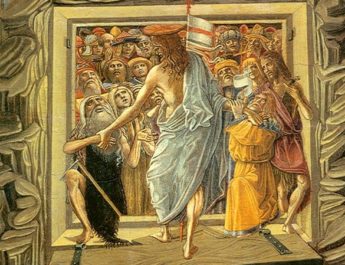1 Corinthians 15:1-11
Easter B19
1 Now I would remindA you, brothersB and sisters, of the good newsC that I proclaimedD to you, which you in turn received, in which also you stand,
A “remind” = gnorizo. From ginosko (to know, recognize, realize, perceive, learn; gaining knowledge through personal experience). This is to declare, know, discover, make known.
B “brothers” = adelphos. From a (with, community, fellowship) + delphus (womb). This is a brother in a literal or figurative sense. It is also used of another member of the Church.
C “good news” = euaggelion. From eu (well, good, rightly) + aggelos (angel, messenger; a messenger from God bringing news – whether a prophet or an angel); {from aggellos (to bring tidings); probably from ago (to bring, lead, carry, guide)}. This is literally “the good news,” used for the gospel. This is also where “evangelism” comes from.
D “proclaimed” = euagelizo. Related to “good news” in v1. From eu (see note C above) + aggelos (see note C above). This is evangelize – literally to preach the good news. It can be those who hear the news, the news, or a way to say gospel.
2 through which also you are being saved,E if you hold firmlyF to the messageG that I proclaimed to you—unless you have come to believeH in vain.I
E “saved” = sozo. From sos (safe, rescued, well). This is to save, heal, preserve, or rescue. Properly, this is taking someone from danger to safety. It can be delivering or protecting literally or figuratively. This is the root that “savior” and “salvation” come from in Greek.
F “hold firmly” = katecho. 18x in NT. From kata (down, against, according to, throughout) + echo (to have, hold, possess). This is to hold fast, bind, possess, restrain, arrest, suppress. It is to hold down in a literal or figurative sense. It can also be to hold something in one’s memory.
G “message” = logos. From lego (to speak, tell, mention). This is word, statement, speech, analogy. It is a word that carries an idea or expresses a thought, a saying. It could refer to a person with a message or reasoning laid out in words. By implication, this could be a topic, line of reasoning, or a motive. It can be used for a divine utterance or as Word – Christ.
H “believe” = pisteuo. From pistis (faith, faithfulness, belief, trust, confidence; to be persuaded or come to trust); from peitho (to have confidence, urge, be persuaded, agree, assure, believe, have confidence, trust). This is to believe, entrust, have faith it, affirm, have confidence in. This is less to do with a series of beliefs or doctrines that one believes and more to do with faithfulness, loyalty, and fidelity. It is trusting and then acting based on that trust.
I “in vain” = eike. 6x in NT. Probably from eiko (to be weak, yield, fail); probably related to hekon (voluntary). This is in vain, without reason, having no effect, idly.
3 For I handed onJ to you as of first importance what I in turn had received: that ChristK diedL for our sinsM in accordance with the scriptures,N
J “handed on” = paradidomi. From para (from beside, by) + didomi (give, offer, place, bestow, deliver; give in a literal or figurative sense). This is literally to hand over – hence to deliver, abandon, or betray. It implies a personal involvement.
K “Christ” = christos. From chrio (to anoint with olive oil, consecrate by anointing). This is the Greek equivalent of the Hebrew “Messiah,” meshiach, which also means anointed one.
L “died” = apothnesko. From apo (away, away from) + thnesko (to die, be dead). This is the root of the word “Thanatos.” This word means to be dying, about to die, decay. Properly, it means to die off – it focuses on the sense of separation from what was before and the coming of what follows.
M “sins” = hamartia. From hamartano (to miss the mark, do wrong, make a mistake, sin); {from a (not) + meros (a part or share)}. Literally, this means not having one’s share or portion – like not receiving inheritance or what was allotted to you. This word means missing the mark so it is used for guilt, fault, and acts of sin.
N “scriptures” = graphe. From a root that means to write. Literally, this means a writing – a document or its contents. In the NT, this always refers to the holy scriptures.
4 and that he was buried,O and that he was raisedP on the third day in accordance with the scriptures, 5 and that he appearedQ to Cephas,R then to the twelve.
O “buried” = thapto. 11x in NT. This can mean literally to bury or it can include burial with funeral rites.
P “raised” = egeiro. This can mean to waken from sleep or to rise from sitting or laying position. It can be to rise from a disease, from obscurity or inactivity, from ruins or nonexistence.
Q “appeared” = horao. This can be to look on someone, experience, perceive, discern, beware. It is to appear in a literal fashion, but has a figurative sense of seeing with the mind. It can include staring at – the implication is to discern clearly. An extension of this verb would be see and attend to.
R “Cephas” = kephas. 9x in NT – 1x in Gospel of John, 4x in 1 Cor, 4x in Gal. While the name Peter comes from the Greek for rock, Cephas comes from the Aramaic kepha for stone or rock. Note that, apart from the Gospel of John, Paul accounts for all other instances of Cephas in the NT, though he does also call Peter Peter in Galatians.
6 ThenS he appeared to more than five hundred brothers and sisters at one time, most of whom are still alive,T though some have died.U 7 Then he appeared to James,V then to all the apostles.W
S “then” = epeita. 16x in NT. This is a different word from the “then” in the previous verse. This one has the sense of “only then” – it emphasizes that what came before was necessary for the next thing to come.
T “still alive” = meno. More literally, “most remain.” Also, stay, wait, await – to stay in a place or state or expectancy. To continue, dwell, endure, be present.
U “died” = koimao. 18x in NT. Different from the word “died” in v3. From a word that means to lay, recline, be placed or set. This word means to sleep or fall asleep. Figuratively, it means to die.
V “James” = iakobos. From the same as Iakob (Jacob); of Hebrew origin from Yaakov (Jacob); from the same as akev (heel, footprint, hind part, horse hoof, lier in wait); from akav (to follow at the heel, assail insidiously, circumvent, overreach). This is the Greek used both for James and for Jacob.
W “apostles” = apostolos. From a word that means to commission, send forth. From apo (away, away from) + stello (to send, set). This word can also be a messenger, envoy, or delegate. It describes a person who is commissioned by someone else as some form of representative. This form places emphasis on the authority of the one who sent them.
8 Last of all, as to one untimely born,X he appeared also to me. 9 For I am the leastY of the apostles, unfitZ to be called an apostle, because I persecutedAA the churchBB of God.CC
X “untimely born” = ektroma. 1x in NT. From ek (from, out of, out from among) + titrosko (to wound). This word is also used for miscarriage and a stillbirth. It is one born outside of the expected time – perhaps also a premature birth?
Y “least” = elachistos. 13x in NT. From a word that means short. This word is smallest, littlest, or lest in size, amount, dignity, etc.
Z “unfit” = hikanos. Literally “who is not fit.” From hikneomai (to come, reach, attain to); from hiko (arrive, come to). This word is able, sufficient, fit, considerable, sufficiently good or worthy, competent, suitable, many. Properly, this word is to reach or attain, hence, adequate.
AA “persecuted” = dioko. From a verb that means put to flight. This word is to put to flight or pursue. By implication, to persecute. Properly, it describes an aggressive chase, though it can be used positively to describe striving and earnest (zealous) pursuit. This is one of the possible root words for “deacon” in Greek and English (in the positive sense, naturally…we hope).
BB “church” = ekklesia. From ek (out from) + kaleo (to call). Literally, a calling out i.e. an assembly or congregation.
CC “God” = theos. From Proto-Indo-European to do, to put, to place (different root from deus in Latin, which comes from a Proto-Indo-European root that means sky or heaven). This word is used for God and for gods in the NT.
10 But by the graceDD of God I am what I am, and his grace toward me has not beenEE in vain.FF On the contrary, I workedGG harderHH than any of them—though it was not I, but the grace of God that is with me. 11 Whether then it was I or they, so we proclaimII and so you have come to believe.
DD “grace” = charis. From chairo (to rejoice, be glad, also a salutation); from char– (favor, disposed to, inclined, favorable towards, leaning towards to share benefit). This word is also kindness, favor, gratitude, thanks.
EE “been” = ginomai. This is not the standard “to be” verb. Rather, the root of this verb is gen- from which we get “generate” in English. This word means to come into being or happen, to be born. Properly, this verb is about emerging or transitioning from one point to another – it implies coming into being with motion, movement, or growth. With this in mind, the sentence more literally carries “God’s grace has not been moving and working in me for nothing.” I wonder if the grace is make the transition or the person is.
FF “vain” = kenos. 18x in NT – 10x of things being “in vain” as here, 6x of being empty or empty-handed, 2x to mean senseless. This word means empty as in empty of moral content or ineffective of foolish. It can be worthless, false, pretentious, or hollow. Properly, it means empty or voice and thus worthless.
GG “worked” = kopiao. From kopos (exhausting labor; to labor until worn out, depleted, exhausted; laborious toil, involving weariness and fatigue); from kopto (to hit, strike, cut, cut off, smite; properly, to be cut resulting in severance (cut off); beat breast or head in lamentation, mourn; to strike a blow that is so hard it seriously weakens or debilitates; fig. deep fatigue, extreme weariness). This word is to grow weary physically and mentally from working hard.
HH “harder” = perissos. From peri (all around, encompassing, excess); related to perisseuo (to be over and above, abound); from the base of peran (on the other side, over, beyond). This word is abundant, more, greater, exceedingly, advantage. It describes something beyond what is anticipated – above and beyond.
II “proclaim” = kerusso. This word means to be a herald or to preach – to announce the message publicly with conviction.
Image credit: “Alive! Many People See Jesus” by Jill Kemp & Richard Gunther.




